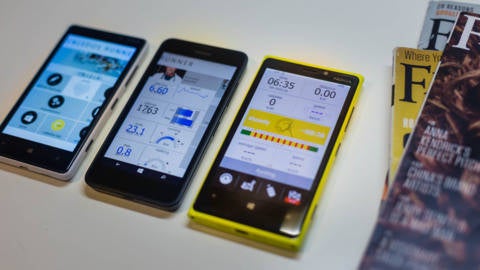Online therapy using your mobile: self-help via apps boom in the mental health (mental health). But there is still a long way before anyone seeking help via apps or chats, according to an annual study of how people use online help.
 However, the use of e-health has grown out of its infancy, the research shows. Throughout the care experimenting with new opportunities. So wants to offer a quarter of GPs next year online help for psychological problems. One third of the psychiatrists are already using such technology outside the office, another third will go do that.
However, the use of e-health has grown out of its infancy, the research shows. Throughout the care experimenting with new opportunities. So wants to offer a quarter of GPs next year online help for psychological problems. One third of the psychiatrists are already using such technology outside the office, another third will go do that.
"With apps to you when you need it themselves receive care. For example, on the street or at a party. Just by mobile phone," said Marc Blom of mental healthcare institution Parnassia. "It gives people the feeling that they have more control over their problems."
Taboo Topics
In mental health online help was more popular because anonymity in taboo subjects can be an advantage. When Parnassiapark use about 91,000 people every month now a form of e-health, says Blom. "It is a new development which we all possibilities are still discovering."
One of the first popular apps Parnassiapark brought onto the market is TemStem, an app for people who hear voices. About 5000 people now use the app. With the app, users learn to distract themselves so that the voices disappear. According to Blom hears about 10 percent of the Dutch vote.
Even when mental health Friesland they experiment with interactive apps. For example, there has been developed an application that makes use of a virtual reality glasses. Thus clients can work from home on their fears, such as agoraphobia.
Challenges
In app stores and on websites can now be found thousands of healthcare apps. However, the rapid growth also leads to problems. So there is little research on online therapy in the longer term. In addition, funding is still difficult, because insurance companies only reimburse for example, conventional therapies.
And the rapid growth also leads to applications that do not work or who are out to obtain personal data. For users, it is increasingly difficult to determine which app is good and what is not.
The Council for Health Care and therefore suggested earlier this year that a mark must be for online help. Then users can immediately see who their data are safe and which apps work. The Trimbos Institute is working on such a label for mental health, but it is not yet widely used.
Debate
There are also opponents of such a label, such as expert Lucien Engelen, director of the Radboud Reshape Center, a knowledge center for technology in healthcare. "A certification mark is killing innovation. The processes to obtain such a label are expensive and slow. For those few guys in an attic with a good idea it is then impossible for something to market."
He points out that online therapy via apps, although growing rapidly, but is still in an early stage and that the wheat itself is separated from the chaff. "The new apps now tumble over each other. But only those well and as efficiently assessed remain. The rest simply disappears. That is a form of selection where the consumer has the power."
The Dutch Patients and Residents Federation (NPCF) is to agree with him, but finds that consumers must be given help to make the right choices in the proliferation of opportunities. So they are working on a manual with tips that people should look for when they want to download an app care.
Oversight
In the Netherlands, the Dutch Health Care Inspectorate supervise the care and medical apps. But they only apps that are considered by law as a medical device. There are currently about 40. The majority is no control. So far, the inspection measures taken against two apps.
Ardi Wings, Research Editor care / http://nos.nl/FLICKR / NICOLA

Reactie plaatsen
Reacties